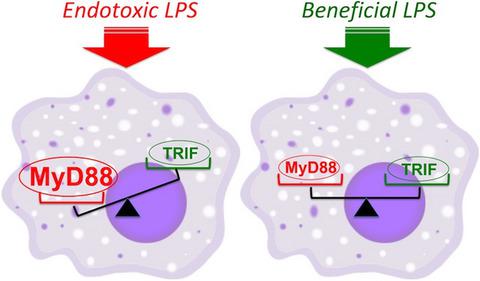当前位置:
X-MOL 学术
›
Chem. Bio. Drug Des.
›
论文详情
Our official English website, www.x-mol.net, welcomes your feedback! (Note: you will need to create a separate account there.)
Cell-line-based assay for the toxicity/benefit analysis of lipopolysaccharides in plants.
Chemical Biology & Drug Design ( IF 3 ) Pub Date : 2019-12-04 , DOI: 10.1111/cbdd.13646 Kriti Kalpana 1, 2 , Shen Yap 1 , Revathi Iyengar 3 , Moriya Tsuji 4 , Akira Kawamura 1, 2, 5
Chemical Biology & Drug Design ( IF 3 ) Pub Date : 2019-12-04 , DOI: 10.1111/cbdd.13646 Kriti Kalpana 1, 2 , Shen Yap 1 , Revathi Iyengar 3 , Moriya Tsuji 4 , Akira Kawamura 1, 2, 5
Affiliation

|
There are many immune-boosting medicinal plants that can potently activate innate immune cells. Recent studies indicate that the active factors of some immune-boosting plants are lipopolysaccharides (LPSs) of plant-associated bacteria. However, little is currently known about the potential risk and benefit of LPSs in medicinal plants. To facilitate their characterization, we established a simple cell-line-based assay that can be used to screen the toxicity and benefit of LPSs in medicinal plants. The assay can distinguish endotoxic diphosphoryl lipid A (DPL) from beneficial monophosphoryl lipid A (MPL), which is a clinically used immunological adjuvant for vaccines. The established assay was used to characterize commercial supplements of Ashwagandha, which was shown to contain immunostimulatory LPSs. The study revealed that Ashwagandha activates macrophages in a manner similar to MPL. The current finding underscores the importance of further studies to characterize the LPSs in immune-boosting medicinal plants.
中文翻译:

基于细胞系的测定法,用于植物中脂多糖的毒性/益处分析。
有许多可以增强先天免疫细胞功能的增强免疫力的药用植物。最近的研究表明,某些增强免疫力的植物的活性因子是植物相关细菌的脂多糖(LPS)。但是,目前对于药用植物中脂多糖的潜在风险和益处知之甚少。为促进其表征,我们建立了基于细胞系的简单测定方法,可用于筛选LPS在药用植物中的毒性和益处。该测定法可以将内毒素性二磷酰基脂质A(DPL)与有益的单磷酰基脂质A(MPL)区别开来,后者是临床上用于疫苗的免疫佐剂。建立的测定法用于表征Ashwagandha的商业补品,该补品被证明含有免疫刺激性LPS。研究表明,Ashwagandha以类似于MPL的方式激活巨噬细胞。目前的发现强调了进一步研究以表征增强免疫力的药用植物中LPS的重要性。
更新日期:2019-12-05
中文翻译:

基于细胞系的测定法,用于植物中脂多糖的毒性/益处分析。
有许多可以增强先天免疫细胞功能的增强免疫力的药用植物。最近的研究表明,某些增强免疫力的植物的活性因子是植物相关细菌的脂多糖(LPS)。但是,目前对于药用植物中脂多糖的潜在风险和益处知之甚少。为促进其表征,我们建立了基于细胞系的简单测定方法,可用于筛选LPS在药用植物中的毒性和益处。该测定法可以将内毒素性二磷酰基脂质A(DPL)与有益的单磷酰基脂质A(MPL)区别开来,后者是临床上用于疫苗的免疫佐剂。建立的测定法用于表征Ashwagandha的商业补品,该补品被证明含有免疫刺激性LPS。研究表明,Ashwagandha以类似于MPL的方式激活巨噬细胞。目前的发现强调了进一步研究以表征增强免疫力的药用植物中LPS的重要性。


























 京公网安备 11010802027423号
京公网安备 11010802027423号